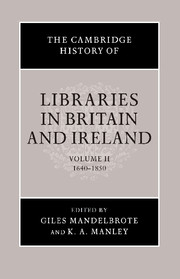Book contents
- Frontmatter
- 1 Introduction: the changing world of libraries – from cloister to hearth
- PART ONE THE EXPANSION OF BOOK COLLECTIONS 1640–1750
- PART TWO LIBRARY DEVELOPMENT AT A LOCAL LEVEL
- 15 Libraries for sociability: the advance of the subscription library
- 16 Local library provision: 1 Norwich
- 17 Local library provision: 2 Belfast
- PART THREE PROVINCIAL AND METROPOLITAN LIBRARIES 1750–1850
- Select bibliography
- Index
- References
16 - Local library provision: 1 Norwich
from PART TWO - LIBRARY DEVELOPMENT AT A LOCAL LEVEL
Published online by Cambridge University Press: 28 March 2008
- Frontmatter
- 1 Introduction: the changing world of libraries – from cloister to hearth
- PART ONE THE EXPANSION OF BOOK COLLECTIONS 1640–1750
- PART TWO LIBRARY DEVELOPMENT AT A LOCAL LEVEL
- 15 Libraries for sociability: the advance of the subscription library
- 16 Local library provision: 1 Norwich
- 17 Local library provision: 2 Belfast
- PART THREE PROVINCIAL AND METROPOLITAN LIBRARIES 1750–1850
- Select bibliography
- Index
- References
Summary
Norwich has been a home to libraries for more than 900 years, and was both a pioneer in the establishment of an independent municipal library in the seventeenth century and the first municipality to adopt the Public Libraries Act in the nineteenth century. Yet until recently the libraries of the eighteenth century have remained largely undocumented, although for much of this period Norwich was the first or second most important English provincial city, and England’s largest manufacturing centre prior to the industrial revolution.
The cathedral library
Of the several monastic and parochial libraries in existence during the middle ages, virtually nothing survived the Reformation. The remains of the cathedral library were finally dispersed in 1574, and the library building was demolished. In 1673 the chapter ordered the creation of a new library in the audit chamber, but it was not until 1681, following the appointment of an energetic young canon named Humphrey Prideaux, that any concrete action was taken. The dean agreed to contribute £20 and each canon £10 in money or books towards the formation of a new collection. Prideaux remained at the cathedral for forty-three years, subsequently as archdeacon of Suffolk and dean. He was an able administrator, who established the new library, secured the appointment of a Mr Paul as library-keeper with a salary of 20 shillings in 1710, 5 and reorganised the chapter archives. Various entries in his diaries refer to gifts of books and money enabling a gradual expansion during the early decades of the eighteenth century, until in 1722 he was able to record: ‘The Library being too straitened conveniently to containe the books therein already placed an order was made that it should be enlarged.’
- Type
- Chapter
- Information
- The Cambridge History of Libraries in Britain and Ireland , pp. 264 - 274Publisher: Cambridge University PressPrint publication year: 2006



